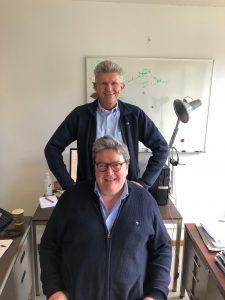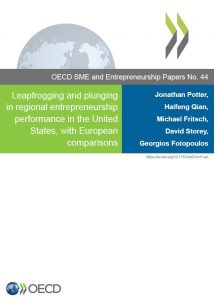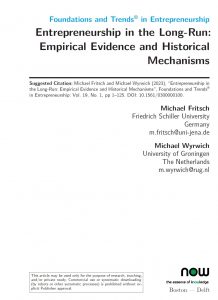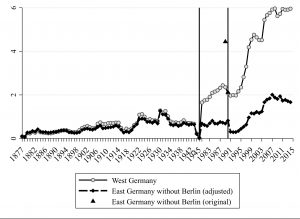I am a professor (emeritus) and former Chair of Business Dynamics, Innovation, and Economic Change at the Friedrich Schiller University Jena, Germany. I am also an editor of the academic journal “Small Business Economics – An Entrepreneurship Journal”.
Ich bin Professor (Emeritus) für Volkswirtschaftslehre (Unternehmensentwicklung, Innovation und wirtschaftlichen Wandel) an der Friedrich-Schiller-Universität Jena sowie ein Editor der Fachzeitschrift „Small Business Economics – An Entrepreneurship Journal“.
CURRENT EVENTS / AKTUELLES
July 2nd, 2024: My paper „On the Roman Origins of Entrepreneurship and Innovation in Germany“ (together with Martin Obschonka, Fabian Wahl, and Michael Wyrwich) is included in the July issue of Regional Studies. The paper is open access and is available under https://doi.org/10.1080/00343404.2023.2276341.
In this paper, we investigate whether the development of regional disparities in entrepreneurship and innovation in Germany can be traced back to Roman rule 2000 years ago. We find a lasting positive Roman effect on the level and quality of entrepreneurship and innovation. This effect might be due to the imprint of local hard factors, such as interregional social and economic exchange, particularly emerging from the integration into the Roman Empire.
June 25, 2024: Maria Greve, Matthias Hügel, Michael Wyrwich und ich haben erstmalig ein Verzeichnis der Industriedenkmale in deutschen Regionen erarbeitet. Dieses Verzeichnis bietet eine Grundlage, um Zusammenhänge zwischen regionaler Geschichte, Erinnerungskultur und einer Vielzahl wirtschaftlicher und sozialer Indikatoren zu analysieren. Neben des Sammlung von Daten bestand ein wesentliches Ziel bei der Erstellung der Datei darin, eine möglichst einheitliche Definition von Industriedenkmal zu entwickeln, um die zum Teil recht unterschiedlichen Begriffsabgrenzungen, die von den Denkmalämter verwendet werden, weitgehend vergleichbar zu machen. Die Daten sowie eine Datensatzbeschreibung stehen bei GESIS zum Download zur Verfügung. https://doi.org/10.7802/2725
Maria Greve, Matthias Hügel, Michael Wyrwich and I have compiled the first ever directory of industrial monuments in German regions. This directory provides a basis for analyzing connections between regional history, the culture of remembrance, and a variety of economic and social indicators. In addition to collecting data, a key objective in compiling the file was to develop as standardized a definition of industrial monument as possible to make the sometimes very different definitions used by the monument authorities largely comparable. The data and a dataset description are available for download from GESIS. https://doi.org/10.7802/2725
May 08, 2024: I am invited for a keynote at this year’s conference of the European Regional Science Association (ERSA) that takes place from August 27 -30 on Teicera Island, Azores, Portugal. My presentation on „Persistence and Change of Regional Entrepreneurship in the Long Run“ is scheduled for Thursday, August 29, 14.30-16.15h. In this lecture, I will provide an overview of the recent research on the long-term persistence and change in regional entrepreneurship. I will discuss alternative explanations of the patterns found. A focus will be on the implications for theory development and regional-level policy. I will identify the main open questions and promising avenues of further research in this important new field.
May 02, 2024: Eine deutschsprachige Zusammenfassung wesentlicher Ergebnisse unserer Analysen (mit Maria Greve und Michael Wyrwich) der Innovationsaktivitäten in Ost- und Westdeutschland ist für die Publikation in der Zeitschrift „Perspektiven der Wirtschaftspolitik“ angenommen worden. Das PDF des Aufsatzes „Historisches Erbe regionaler Innovationstätigkeit – Der Fall Ost- und Westdeutschland“ ist unter dem Link https://doi.org/10.1515/pwp-2023-0025 verfügbar.
Zusammenfassung: Wir untersuchen die Auswirkungen der deutschen Teilung und der Wiedervereinigung auf die Innovationsaktivitäten in Ostdeutschland. Dabei stellen wir nach der Wiedervereinigung im Jahr 1990 ein zunehmendes Ost-West-Gefälle der Innovationsaktivitäten fest. Die empirischen Analysen deuten darauf hin, dass trotz der Zunahme an Innovationsaktivitäten im Osten, die Vorteile der Integration der beiden Innovationssysteme zu einem großen Teil in Westdeutschland anfielen. Offenbar beruht das zunehmende Ost-West-Gefälle nicht allein auf der Ineffizienz ostdeutscher Innovationsaktivitäten während der sozialistischen Periode, sondern auch auf der im Rahmen der schnellen Wiedervereinigung erfolgten Schock-Transformation.
Zu einer ausführlicheren englischsprachigen Darstellung der Ergebnisse (frei verfügbar ohne Paywall) siehe:
Fritsch, Michael, Maria Greve und Michael Wyrwich: Shades of a Socialist Legacy? Innovation Activity in East and West Germany 1877-2014. Jena Economic Research Papers #2023-001, Friedrich Schiller University Jena. https://ideas.repec.org/p/jrp/jrpwrp/2023-001.html
Fritsch, Michael, Maria Greve und Michael Wyrwich: Historical Legacies of Regional Innovation Activity – The Case of East (and West) Germany. In: Jutta Guenther, Dagmara Jajeśniak-Quast, Udo Ludwig and Hans-Jürgen Wagener (eds.): Roadblocks to the Socialist Modernization Path and Transition—Evidence from East Germany and Poland. London 2024: Palgrave Macmillan. 91-111. https://doi.org/10.1007/978-3-031-37050-2_4
April 20, 2024: The article (with Mari Greve and Michael Wyrwich) „The Deep Historical Roots of Industrial Culture and Regional Entrepreneurship — A case study of two regions“ ist now published in a very up to date collection of great articles edited by Robert Huggins, Fumi Kitagawa, Daniel Prokop, Christina Theodoraki and Piers Thompson. The title of the book is Entrepreneurial Ecosystems in Cities and Regions: Emergence, Evolution, and Future published by Oxford University Press https://academic.oup.com/book/56177?login=false. In our contribution we describe and compare the development trajectories of two German regions, South Saxony and Mecklenburg, with a special focus on entrepreneurship and innovation. see https://doi.org/10.1093/oso/9780192866264.003.0003
April 18, 2024: The description of „Comprehensive Patent Data of the German Democratic Republic 1949-1990“ that we compiled and made publicly available (with Ann Hipp, Maria Greve, Jutta Günther, Marcel Lange, Christian Liutik, Beate Pfeifer, Mariia Shkolnykova and Michael Wyrwich) was published in the Journal of Economics and Statistics, 244 (2024), 149–158 https://degruyter.com/document/doi/10.1515/jbnst-2022-0058/html
April 10, 2024: I very much enjoyed two days of intensive discussion and productive knowledge exchange with my friend and colleague Marcus Dejardin in a relaxed atmosphere at the Université de Namur (Belgium). Many thanks, Marcus, for your exceptional hospitality!

March 4, 2024: Am 20. März 2024 werden im Rahmen einer Podiumsdiskussion in Berlin aktuelle Forschungsergebnisse zur Transformation in Ostdeutschland sowie in Polen seit dem Systemumbruch Anfang der 1990er Jahre diskutiert. Auf dem Podium sind Prof. André Steiner (Leibniz-Zentrum für Zeithistorische Forschung, Potsdam), Carsten Schneider (Staatsminister und Beauftragter der Bundesregierung für Ostdeutschland) sowie Vertreter des Forschungsverbundes „Modernisierungsblockaden in Wirtschaft und Wissenschaft der DDR“ (ModBlock). Die Veranstaltung mit dem Titel „Überraschende Befunde zur Modernisierung in der DDR und der Volksrepublik Polen: Potentiale für künftige Transformationen“ findet statt von 17:00-19:30 Uhr im Kurfürstensaal der Vertretung des Landes Brandenburg beim Bund, In den Ministergärten 3, 10117 Berlin. Flyer
March 1, 2024: Here is a rather instructive article that discusses the results of our analyses (with Maria Greve and Michael Wyrwich) of innovation activity in post-socialist countries of Eastern Europe, particularly in East Germany.
February 29, 2024: Uff! Geschafft! Heute wurden die Texte und Abbildungen der 4. aktualisierten und erweiterten Auflage des Lehrbuches „Entrepreneurship – Theorie, Empirie, Politik“ an den Springer-Verlag übermittelt. Das Buch wird wahrscheinlich in der zweiten Jahreshälfte verfügbar sein. Neu als Ko-Autor hinzu gekommen ist Matthias Menter, der nun die Professur für Unternehmensentwicklung, Innovation und wirtschaftlichen Wandel an der Friedrich-Schiller-Universität Jena innehat. Wie schon bei der 3. Auflage des Buches als Autor mit dabei ist auch mein langjähriger Kooperationspartner Michael Wyrwich (Universität Groningen und Friedrich-Schiller-Universität Jena).
January 2, 2024: This new paper with Maria Greve and Michael Wyrwich describes and analyzes the long-term development of self-employment in German regions between 1895 and 2019. Based on rankings (“league tables”) for the two years, we identify those regions where the relative level of self-employment significantly increased (‘leapfroggers’), and those where the level of self-employment as compared to other regions deteriorated (‘plungers’). Germany is a particularly interesting case due to the turbulent history of the country over the 20th century including two lost World Wars, occupation by foreign armies, forty years of division into a capitalist and a socialist state, as well as re-unification and shock transformation of the eastern part to a market economy. While there is some persistence of regional self-employment despite all the disruptive changes, we also find and discuss considerable changes in regional levels of entrepreneurial activity. https://oweb.b67.uni-jena.de/Papers/jerp2023/wp_2024_001.pdf
December 28, 2023: I contributed to an article honoring my colleague David J. Storey who passed away last summer. The article is titled „Remembering David J. Storey, a Pioneer of the Entrepreneurship Field“ (with Simon C. Parker, Thomas Åstebro, David B. Audretsch, Robert Blackburn, Andrew Burke, Alex Coad, Marc Cowling, Per Davidsson, Francis Greene, Paul Reynolds, and Roy Thurik). It will be published in Small Business Economics – An Entrepreneurship Journal and can be found here.
December 20, 2023: I am organizing Special Sessions on
„Fostering Sustainable Regional Development: The Central Role of Entrepreneurship and Policy“
at the 2024 ERSA Congress on Terceira (Azores) together with Marcus Dejardin, Maria Greve and Korneliusz Pylak. The Call for Papers can be found here. We are looking forward to your submissions!
November 27, 2023: Happy to find out that I am again listed by Elsevier among the top 2% highly cited academic authors world wide. See https://elsevier.digitalcommonsdata.com/datasets/btchxktzyw/6
November 27, 2023: I am happy to announce that my paper
„On the Roman Origins of Entrepreneurship and Innovation in Germany“
written together with Martin Obschonka, Fabian Wahl, and Michael Wyrwich has just been published online in Regional Studies. The paper is open access and is available under https://doi.org/10.1080/00343404.2023.2276341.
In this paper we investigate whether the development of regional disparities in entrepreneurship and innovation in Germany can be traced back to Roman rule 2000 years ago. We find a lasting positive Roman effect on the level and quality of entrepreneurship and innovation. This effect might be due to the imprint of local hard factors, such as interregional social and economic exchange, particularly emerging from the integration into the Roman Empire. This effect remains robust when a number of other significant historical developments are taken into account. We hope that these results stimulate a scholarly debate on the probably underestimated importance of ancient roots of economic development. History matters !!!
October 20, 2023: Here is a new working paper that I wrote with Alina Sorgner and Michael Wyrwich. It is about self-mployment at older age. The title is
„Are Senior Entrepreneurs Happier than Who? The Role of Income and Health„.
In this paper, we propose an extension of the standard occupational choice model to analyze the life satisfaction of senior entrepreneurs as compared to paid employees and particularly retirees in Germany. The analysis identifies income and health status as main factors that shape the relationship between occupational status and life satisfaction. Senior entrepreneurs enjoy higher levels of life satisfaction than retirees and senior paid employees. This higher life satisfaction is mainly due to their higher income. Physical and mental health play a crucial role in determining both an individual’s occupational status and their overall life satisfaction. We find that senior self-employed report to be healthier compared to other groups of elderly individuals. However, when controlling for health, retirees exhibit an even higher level of life satisfaction compared to their self-employed counterparts. Heterogeneity analysis of various types of senior entrepreneurs and senior paid employees confirms this general pattern. In addition, we find some evidence indicating that senior entrepreneurs may compromise their leisure time, a main asset of retired individuals. Implications for research, policy, and practitioners are discussed. The paper can be downloaded here https://ideas.repec.org/p/jrp/jrpwrp/2023-016.html
October 1, 2023: My paper „Historical Legacies of Regional Innovation Activity – The Case of East (and West) Germany“ with Maria Greve and Michael Wyrwich has just been published in the book Roadblocks to the Socialist Modernization Path and Transition—Evidence from East Germany and Poland (London 2024: Palgrave Macmillan), edited by Jutta Guenther, Dagmara Jajeśniak-Quast, Udo Ludwig and Hans-Jürgen Wagener. The contributions to the book summarize main results of the joint research project Modernisierungsblockaden in Wirtschaft und Wissenschaft der DDR (Obstacles to Modernization in the Economy and Science of the GDR) that was financed by the German Federal Ministry of Education and Research. The book is open access and can be downloaded under https://doi.org/10.1007/978-3-031-37050-2
September 14, 2023: Ein neuer Beitrag in der Sendung „Quarks Daily – Dein täglicher Wissenspodcast“ des Westdeutschen Rundfunks erklärt sehr schön die Befunde unserer Studie zu „Regionalen Persönlichkeitsunterschieden in Deutschland“ https://doi.org/10.1026/0033-3042/a000414.
Hier ist der Link zu dem Podcast: https://www1.wdr.de/mediathek/audio/daily-quarks/audio-typisch-norddeutsch—wie-unser-wohnort-uns-praegt-100.html
Wir sind weiter an dem Thema dran! Mehr folgt demnächst.
August 15, 2023: Happy to announce that the German Federal Ministry of Education and Research is financing our project (with Michael Wyrwich, Maria Greve, NN) on The Legacy of the GDR Innovation System – Intra-German Comparison and Comparison with Neighboring Countries in East-Central Europe (Modernisierungsblockaden in Wirtschafts und Wissenschaft der DDR. Entstehung und Folgen im innerdeutschen Vergleich und im Vergleich mit Nachbarländern in Ostmitteleuropa) for another two years beginning October 1, 2023. A key topic for the new project stage is a comparison of innovation and patenting in East Germany with two other post-socialist countries, the Czech Republic and Poland.
July 24, 2023:

In a new study published by the OECD, Jonathan Potter, Haifeng Qian, David Storey, Georgios Fotopoulos and I investigate the dynamics of regional entrepreneurship in the US over a period of about a century and compare the results with Germany and England & Wales. A main finding is that the stickiness (persistence) of regional entrepreneurship levels in the US is comparable to what was found in a number of European countries. The study identifies the types of regions that improve markedly (“leapfroggers”) or decline sharply (“plungers”) in their rank positions and the reasons for these changes. The paper draws out policy implications on regional levelling-up of entrepreneurship activity and sets out an agenda for further research. See dx.doi.org/10.1787/bc031b
July 10, 2023: In a new paper, Michael Wyrwich and I explore three important mechanisms behind the transmission of an entrepreneurial culture over a long period of time. First, we analyze the role model effects at the household level. We hypothesize that the larger the households of self-employed, the greater the opportunities for role model effects such as an intergenerational transfer of entrepreneurial values and attitudes, and hence the higher the regional start-up rate in later periods. Second, we investigate how the economic success of regional entrepreneurs fuels the role model effects. Third, we analyze if and to what extent the economic success in of regional entrepreneurship stimulates a collective memory of historical entrepreneurship that spurs self-employment in later periods. The analysis of entrepreneurship in German regions over a period of more than 90 years provides support for the significance of all three transfer channels.
The paper can be downloaded at https://ideas.repec.org/p/jrp/jrpwrp/2023-006.html. Comments are very welcome!
June 15, 2023: My paper „Creativity, knowledge and institutions: A European perspective on Florida’s ‘The Rise of the Creative class’ 20 years later“ (with Bjørn T. Asheim, Høgni K. Hansen and Arne Isaksen) has been published in the book Amit Batabyal and Peter Nijkamp (eds.): The Creative Class Revisited: New Analytical Advances. Singapore: World Scientific Publishing 2023, 325–342. https://doi.org/10.1142/9789811267659_0011 The chapter recaps the key tenets of the creative class theory of economic development and discusses the key issues in the conceptual and analytical debate it has inspired.
January 10, 2023: My paper „Entrepreneurship in the Long Run: Empirical evidence and historical mechanisms“ (with Michael Wyrwich) is now out in Foundations and Trends in Entrepreneurship, 19 (2023), No. 1, 1-125. https://doi.org/10.1561/0300000100
Abstract: We review and discuss research on the development of regional entrepreneurship over time. A particular focus is on the long-term persistence of regional levels of entrepreneurship, its explanation, and its meaning for economic development. What is the state of empirical research in this field, and what can explain the empirical findings? How are long-term trends of entrepreneurial activity linked to regional performance in terms of employment, gross domestic product (GDP), and innovative activity? Based on our assessments we derive conclusions for theory, policy implications, and avenues for further research.

January 2, 2023: How did German reunification affect innovation activities in the Eastern and the Western part of the country? Does the innovation system of East Germany converge towards West German level? A new paper with Maria Greve and Michael Wyrwich investigates these issues by means of a difference-in-difference approach. Our findings indicate that integrating the two innovation systems mainly benefitted the West.
Fritsch, Michael, Maria Greve and Michael Wyrwich: Shades of a Socialist Legacy? Innovation Activity in East and West Germany 1877-2014. Jena Economic Research Papers #2023-001, Friedrich Schiller University Jena. https://ideas.repec.org/p/jrp/jrpwrp/2023-001.html

Average number of patent applications per 10 thousand population in East and West Germany 1877 to 2014
Abstract: The unification of the East and West German states in 1990 initiated the integration of two distinct innovation systems. In this process, the poorly functioning socialist system of East Germany adopted the formal institutions and organization of West Germany, a western-style market economy. We investigate the effect of this integration on patenting activity by applying a. While patenting activity increased in both parts of the country until recently, the gap between East and West Germany widened considerably over time. This divergence in innovation activity suggests that current East-West differences may be indirectly rooted in this socialist legacy and the sudden shock transformation that occurred upon reunification. We also find that the similarity of the technology profile of the East and West German innovation systems is crucial to understand the divergence. So, East German innovation activity fell behind especially in technologies where both East and West Germany were specialized in before re-unification. The same applies to technologies where only West Germany was specialized in.
